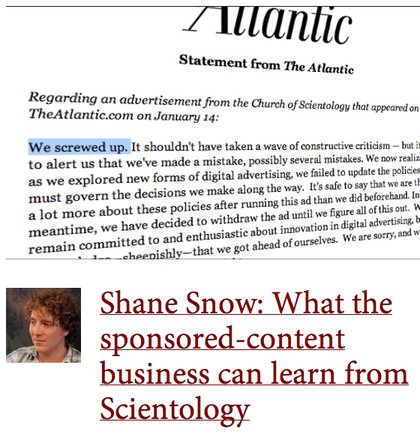The Atlantic’s “screw up” earlier this week publishing an advertorial by the Church of Scientology under the guise of a brand sponsored post could be the content marketing industry’s gain.
The outrage over the post, “David Miscavige Leads Scientology to Milestone Year,” an article that the church produced and paid for, prompted The Atlantic to take it down 12 hours after it went up Monday, eliciting a mea culpa from the publisher along with a vow to review its policies surrounding its sponsored content.

The incident provided a good media story for the week, and The Atlantic and The Church of Scientology took a hit over the story, but over the long-term the attention it garnered also provides an opportunity to reaffirm best practices for the burgeoning industry.
“The underlying principle behind all good content — sponsored or no — is maintaining the reader’s trust.” — Shane Snow, CCO of Contently
Two officers at Contently, which has worked with The Atlantic on brand sponsored accounts although had no role in the Scientology campaign, published posts this week about the incident, saying this highlighted the need for media companies and brands to be more conscious and transparent about how they publish, what they publish and how they work together.
Shane Snow, Contently co-founder and chief creative officer, wrote for Harvard’s NeimanJournalism Lab, “The collective fury over The Atlantic’s latest sponsored content campaign — where The Church of Scientology posted a propagandistic story about its ‘unprecedented’ success — shines a light on the inelegancies of an evolving model.”
Snow wrote: “Most sponsored submissions at The Atlantic go through an editorial wringer to ensure quality and minimize surprises. Yesterday’s Scientology post for some reason defied best practices, and people flipped out. The underlying principle behind all good content — sponsored or no — is maintaining the reader’s trust.”
“The number one rule of branded content continues to hold true: don’t talk about yourself.” — Joe Coleman, CEO of Contently
Joe Coleman, Contently co-founder and CEO, wrote on his blog that the misstep was an opportunity to examine the “bright line” that separates quality branded content from sketchy advertorial.
“As media companies continue to rely on sponsored content to drive revenue, stories like these are an important barometer for how the space is maturing,” Coleman wrote. “Two things in particular stand out from the hubbub. First, the number one rule of branded content continues to hold true: don’t talk about yourself. Branded content is incredibly transparent; readers know exactly who is backing a piece of content, so self-serving content is immediately recognizable. Ignoring this rule is insulting to readers and can seriously damage a brand.”